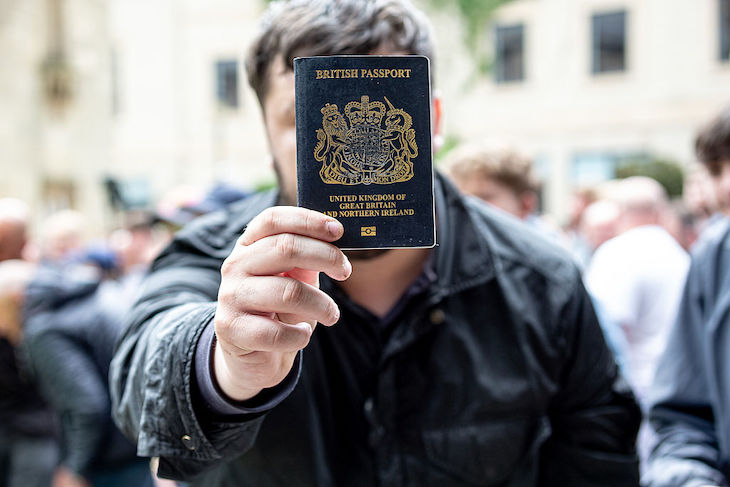A North Korean escapee recently told me about the ‘slavery cards’ he and his fellow countrymen were forced to carry. These cards allowed the state to know everything about you; they could stop you working or walking the streets without fear. They ultimately owned your existence. You can imagine his reaction to Keir Starmer’s new ID scheme.
Wherever ID is introduced it is because the state does not trust its people
Starmer’s digital ID plan is a façade to a deeper problem: unlike the North Korean escapee, many in Britain seem to have forgotten what made us so free. Once, ID cards were tantamount to the death of England – and ‘who lives if England dies?’. Now, we are at best evenly split, at worst solidly in favour of ID cards – one recent poll has support at 57 per cent. A reigniting of English feeling is clearly needed.
Supporters say ID cards are convenient and will stop illegal immigration. Yet Germany simultaneously has these cards and high illegal immigration, while in Britain we already have work visas, national insurance numbers, and fine hotels, none of which seem to be much of a deterrent.
If voter ID is anything to go by, more innocent law-abiding people will be prevented from getting on with their lives than criminals will be caught. In 2024, there were just seven allegations of voter impersonation, and none led to conviction, yet according to the Electoral Commission some 16,000 potential voters did not vote because of voter ID. As the Judge, Lord Goddard, stated in 1951 at the trial of Harry Wilcock, who refused to present ID to an officer, these laws ‘turn law-abiding subjects into lawbreakers’.
The crux of English misgivings was that ID fundamentally reverses the relationship between the individual and the state. Europe doesn’t just have more sun and, allegedly, better food; it also has a different legal tradition. To them, the government decides where you are free by giving you rights – libertas ex lege. Here, in England, we are born free apart from the state, which only decides what you cannot do. ID reverses this English tradition by making us the property of the state.
On the one hand, this dehumanises us. Instead of being free English people with our own names given us by our parents, we are ‘branded with a number, like a motorcar’. These new names, which will resemble the sort of thing Elon Musk calls his children, are given us by our new parent: the state. On the other, we will cease to be seen as innocent till proven guilty and instead be seen as constant suspects and potential illegal immigrants.
Wherever ID is introduced it is because the state does not trust its people, as, for instance, when our own colonial administration in India introduced them because it regarded the local people as untrustworthy. In effect, Starmer is announcing to the world that he does not trust the British people to be good.
This loss of trust goes the other way. Stop and Search, for instance, has harmed the relationship between the police and the black community, and Lord Goddard noted in 1951 that ‘such actions tend to make people resentful of the acts of the police’. Surely the police can’t justify losing more trust with the British people.
Ultimately, ID cards are about control. We do not need to be conspiratorial. Starmer wants to control who can work, and who knows what else. During the great wars they wanted to compel people to join up and control how much food they could eat. In North Korea and China they want to freeze you out of society if you don’t comply. Governments are not like companies, their control is much greater and when their data is hacked the implications are much worse. Nothing to fear nothing hide? We all have something to fear when the state decides what it is we are required to hide.
To those that say that this tyranny won’t happen here in our future, it is worth reminding them that such tyranny has happened here in our past. It is precisely because we responded to that tyranny as we did, and established, amongst other things, a natural English feeling against identity cards, that we have enjoyed a peculiar and unparalleled freedom. The fact that the UK government already has a great deal of data on us is not a reason for us to give them even more.
In our past, when perhaps our history was better known and felt, the objections were much clearer. ID cards went against the spirit of our nation, ‘England the freedom loving’. If Starmer is able to implement his digital ID scheme, they will have become our masters and we their servants; as the MP Llewelyn Williams put it in 1915, we risk losing ‘all that England stands for’.







Comments